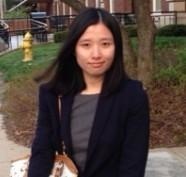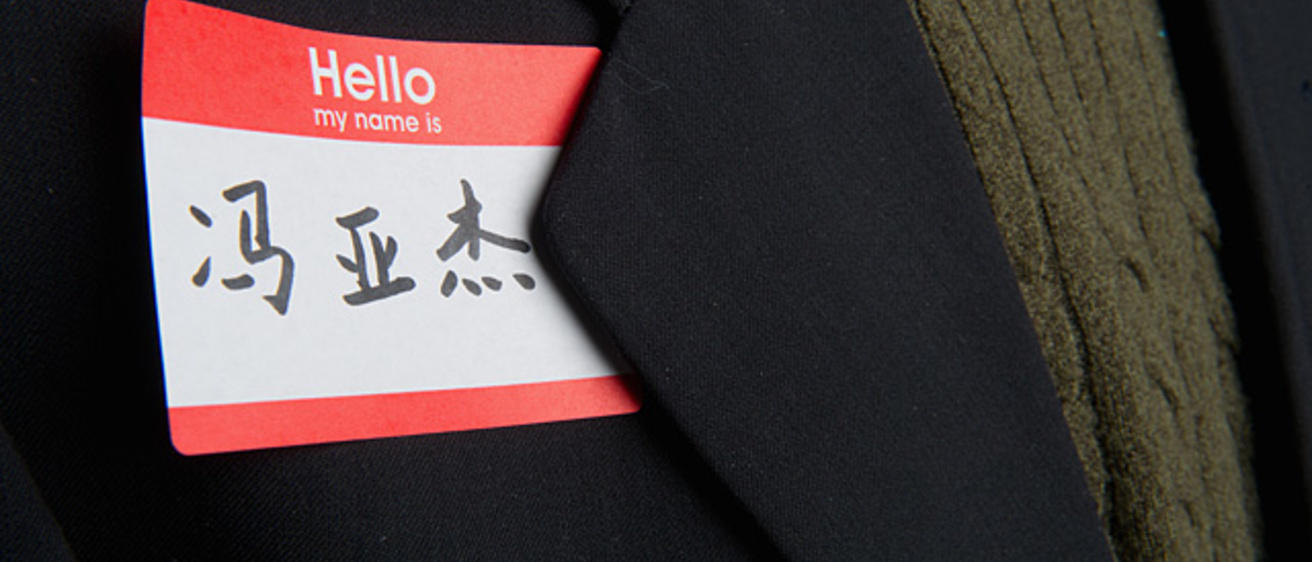Chinese students at the University of Iowa may be used to hearing their names rendered into unrecognizable sounds by linguistically challenged faculty but it probably doesn't help them adjust to life in Iowa.
That's why the Tippie College of Business has begun offering a variety of programs focused on bridging the cultures, including a recent workshop to teach faculty and staff how to properly pronounce Chinese names. And not a moment too soon. This year, Tippie has 497 international students, 15 times more than the 34 international students enrolled in 2005; 412 of them are from China.
The workshops were attended by about 50 faculty, staff, and administrators and were conducted by Xi Ma, a program associate in the UI Confucius Institute in International Programs.

“When you see a Chinese name and you don’t understand Chinese, you have no idea how to pronounce the letters, even if they’re in English,” says Ma. For instance, x, which for those used to reading the Roman alphabet could be pronounced“eks”as in X-ray or even “z” as in xylophone is pronounced closer to “she” in Chinese. And “i” is pronounced “ee” in Chinese.
Ma says it's further complicated because Chinese is a much more tonal language than English, with four tones that don’t even exist in English. This is why, to Western ears, it has such a sing-song quality, and it makes pronunciation even more important in Chinese than in English. For instance, while you might expect Ma’s first name, Xi, to be pronounced “she,” the tone of the second syllable is much less drawn out, so the “ee” is pronounced with more of a half-count. Xi sounds more like “sheet,” only without the “t.”
“Tone is very important, and subtlety of pronunciation is important,” acknowledges Ma, who was trained as a Chinese-English translator and now works as a foreign language instructor. “It’s especially difficult with a person’s name because there’s nothing that tells you how to pronounce the tones, except to ask the person about his or her name in Chinese characters.”
In order to get those syllables and tones right, Westerners might have to twist their mouths into unfamiliar shapes.
“You have to open your mouth a little wider or make it a little rounder than you’re used to,” she says. The tongue also has to move in ways that challenge the muscle memory of Westerners. Take the Chinese “zh,” for instance. Properly pronounced, the tongue would start making the familiar "z" sound, but then the tip would be rolled up close to the roof of the mouth to force out air so a sound is created for which there is no English equivalent.
“That’s difficult and takes a lot of practice.”
Dai Chong
Xi Ma, a program associate in the UI Confucius Institute, demonstrates the pronunciation of 10 Chinese names.
Feng Ya Jie
feng-ya-jie.mp3
Lin Sen
lin-sen.mp3
Ma Hong Zhan
ma-hong-zhan.mp3
Mi Xue
mi-xue.mp3
Pan Jie Yun
pan-jie-yun.mp3
Shen Huan
shen-huan.mp3
Wang Bi Jun
wang-bi-jun.mp3
Wang Chong Jing
wang-chong-jing.mp3
Zhou Teng Da
zhou-teng-da.mp3
Firefox users: Please note that Firefox does not yet support HTML5 audio controls for mp3 files. Please click on the mp3 link(s) above to listen to the audio file(s).
Ma’s Chinese name pronunciation workshop at Tippie taught a system called hanupinyin, which converts the sounds of the Chinese language into letters of the Roman alphabet so Westerners can read it more easily. The first widespread pinyin was a system called Wade-Giles that was developed by a pair of British diplomats in the 19th and early 20th centuries. But in the 1950s, following the Chinese revolution, the mainland communist government developed the new pinyin based on Mandarin that slowly grew until it was accepted as the universal Roman conversion in the 1980s. This is how Peking became Beijing in the West, and Chungking became Chongqing.
Yet another complication is that hanupinyin is used only to convert Mandarin. It isn’t used widely in Taiwan or those parts of mainland China where they speak the Cantonese dialect.
The workshops were intended to be only a very brief introduction to Mandarin pronunciation, but not so brief that it didn't make for an enlightening and uncomfortable experience for Lon Moeller.

“I’ve been reading names at commencement for years and I realized, oh my gosh, I’ve been pronouncing them all wrong,” says Moeller, associate dean for Tippie’s undergraduate program.
“The language barrier is frustrating for our faculty who want to connect with students,” he says. “The best thing you can do to build a strong relationship with another person is learn their name and then pronounce it correctly, and as we’ve learned, we aren’t doing that.”
The workshop was part of an initiative undertaken in Tippie this year to help accommodate the growing number of Chinese students. Mark Archibald was brought onto the Undergraduate Program Office’s staff to develop new programs to help bring international students from all countries more comfortably into the Tippie and UI circle.
The Frank Business Communications Center has also added extra staff to help Chinese students write and speak English more effectively, and last fall the college offered for the first time an international student orientation that offers information about university resources specifically for students who come from outside the United States.
The college has also beefed up its slate of cultural competency workshops, offering International Programs’ “Building Our Global Community” certificate, trivia contests, business fairs, and other events that bring together Chinese and U.S. students. The Pomerantz Career Center is also offering additional workshops to help international students write resumes and interview for jobs, and discussion circles give Chinese students the opportunity to converse in English with domestic students to build their bilingualism.
A global pen pals program spearheaded by the Center for Diversity and Enrichment in the Chief Diversity Office is also underway that pairs a first year Tippie student with an international student who will start at UI next year, introducing international students to UI students and culture before they even arrive.
